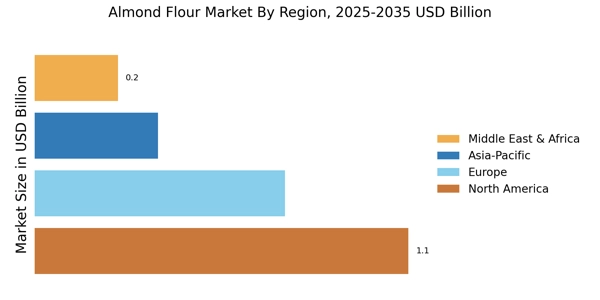Increased Use in Baking and Cooking
The versatility of almond flour in various culinary applications has significantly contributed to its market growth. It is widely used in baking, cooking, and as a thickening agent in sauces and soups. The almond flour market is witnessing an uptick in usage among both home cooks and professional chefs, who appreciate its ability to enhance flavor and texture in a variety of dishes. Additionally, the rise of social media platforms has facilitated the sharing of recipes and cooking tips that feature almond flour, further driving its adoption. As more consumers experiment with almond flour in their kitchens, the market is expected to expand, reflecting a broader trend towards innovative cooking practices.
Nutritional Benefits of Almond Flour
Almond flour is recognized for its rich nutritional profile, which includes high levels of protein, healthy fats, and essential vitamins and minerals. This has contributed to its growing popularity among health-conscious consumers. The almond flour market is increasingly appealing to those looking to enhance their diets with nutrient-dense ingredients. Research indicates that almond flour contains lower carbohydrates compared to traditional flours, making it a favorable option for those following low-carb or ketogenic diets. As awareness of the health benefits associated with almond flour continues to spread, the market is likely to experience sustained growth, driven by consumers seeking healthier alternatives in their culinary practices.
Rising Demand for Gluten-Free Products
The increasing prevalence of gluten intolerance and celiac disease has led to a notable rise in demand for gluten-free products, including almond flour. As consumers become more health-conscious, they actively seek alternatives to traditional wheat flour. This trend is particularly pronounced among individuals adhering to gluten-free diets, which has propelled the almond flour market forward. According to recent data, the gluten-free food market is projected to grow significantly, with almond flour being a key player in this segment. The almond flour market is thus positioned to benefit from this shift in consumer preferences, as more people opt for gluten-free options in their baking and cooking endeavors.
Growing Popularity of Plant-Based Diets
The shift towards plant-based diets has emerged as a significant driver for the almond flour market. As more individuals adopt vegetarian and vegan lifestyles, the demand for plant-based ingredients has surged. Almond flour, being a plant-derived product, aligns perfectly with this trend, offering a nutritious and versatile alternative to traditional flours. Market data suggests that the plant-based food sector is experiencing rapid growth, with almond flour playing a crucial role in this transformation. The almond flour market is likely to benefit from this trend, as consumers increasingly seek out plant-based options that cater to their dietary preferences and ethical considerations.
Expansion of Retail and Online Distribution Channels
The almond flour market is experiencing a transformation in distribution channels, with a notable expansion in both retail and online platforms. As e-commerce continues to grow, consumers have greater access to a variety of almond flour products, which enhances market visibility and availability. Retailers are increasingly stocking almond flour in health food sections, catering to the rising demand for gluten-free and health-oriented products. This shift in distribution strategies is likely to facilitate market growth, as consumers are more inclined to purchase almond flour when it is readily accessible. The almond flour market stands to gain from these developments, as enhanced distribution channels contribute to increased consumer awareness and purchasing opportunities.


















